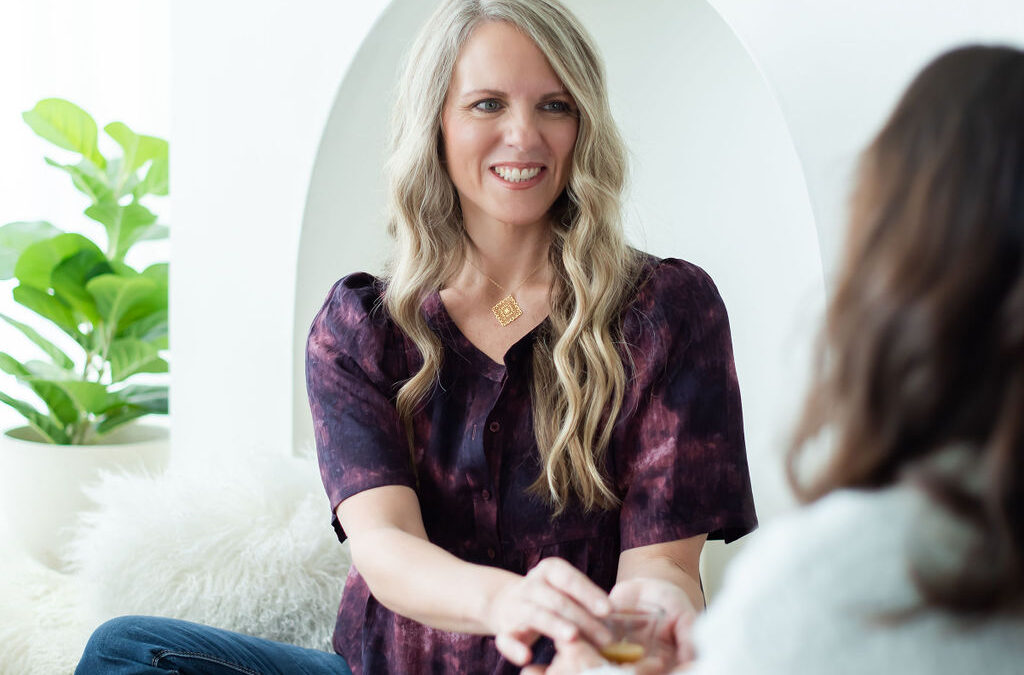As a therapist and a coach, I have been on both sides of the search for a good practitioner to help navigate old trauma and relationship struggles. Aside from 15+ years as a psychotherapist, I am also an instructor of transpersonal counseling and I train practitioners in the art of sacred space holding. I have learned over the years that even the most well-intentioned practitioner can engage in unconscious patterns that inhibit transformation and healing.
Therapists and coaches seek out training because they are passionate about serving others on their journey. What you might not know is that many training programs focus mainly on theory and leave practitioners without any real or practical way to offer you the guidance that you long for. This means that even the most passionate practitioners with the most degrees and trainings are often unaware of the essence of holding space in a way that honors your wholeness.
As an instructor, the very first thing I teach my students is the importance of staying fully present and aware as they trust in their client’s wholeness. You may be surprised at how challenging this is for many practitioners. The impulse to fix, change, or offer advise disrupts this essential aspect of holding sacred space for you. However, when a practitioner is able to hold the vibrational qualities of awake awareness, their presence will be a reminder for you to come back home to your Self. You will know you are in the presence of a skilled practitioner when you remember you are whole and have the capacity to transform in each session.
Here are 8 *essential* qualities to look for in a therapist or coach:
1) They fully see and hear you, even at the initial consult or intake: Most practitioners offer a free 20-30 min phone consult to see if you are a good fit for one another. Even though this is technically not a session, in this short amount of time with your potential therapist or coach you can learn a lot about how you feel in their presence. If you feel seen and heard, you will likely feel more regulated after a short time with them. You will see yourself more clearly, and there may even be a ping of intuition within you saying, “This is the place for me.” Trusting the feedback within your being will let you know if this person has the ability to support you in your healing and transformation.
2) They see you as the expert: This might seem like a strange twist on the relationship because you are likely hiring them because they are an expert. However, if the practitioner believes they are the expert, they will likely believe that they have the answers to your problems, which takes away your autonomy and power. You are the expert in the room and this is your work to do. A practitioner who honors this is honoring the container as a sacred space just for you.
3) They illuminate your shadow: Although you are the expert in the room, you also have blindspots–aspects of yourself that you cannot see. A practitioner who does not bring attention to your shadow enables you to stay the same. For some practitioners, this can be scary or uncomfortable. However, when your therapist or coach points out your shadow to you in a way that is compassionate and honors you as the expert, you can see aspects of yourself that you may be unaware of altogether.
4) They own their perception: With you as the expert in the room, the practitioner’s job is to be a clean, clear mirror of reflection. When they see you clearly, you increase your own self-awareness and you begin to see yourself more clearly, too. When the practitioner thinks they’re learning something about you or seeing something about you, it’s important that they own that perception as theirs and see if it fits for you. Not only does this honor your sovereignty, it also honors the sacred boundary where you and your practitioner meet as two whole individuals.
5) They trust your intuition: A practitioner who sees you as the expert will also trust your intuitive knowing, and they will help guide you into deeper contact with your intuitive knowing. While the practitioner also has intuition that may be present in the session, ultimately your connection to your own intuition will be essential in your transformation.
6) They welcome every aspect of your inner world: Some practitioners are taught that in order for clients to do deep work they need to be open or non-judgmental. This just isn’t true. It is the practitioners job to invite in more compassion and love and awake awareness to every layer of your experience. Your resistance is valid. Your fear is valid. Your judgment is valid. The more welcoming the practitioner is of all of the aspects of you, the more safety is built and the more able you become to love yourself unconditionally.
7) They are regulated: A practitioner who has the capacity to regulate their nervous system becomes a co-regulating presence for their clients. This means that you might hear them taking deep breaths, placing a hand on their heart, or even moving their body. Creating inner spaciousness is what allows them to create more spaciousness in the container with you. This is a true gift where you can learn that you are safe to be exactly as you are.
8) They are fully present with you: Some practitioners learn to ask questions that are not present moment centered. This means that they are trying to lead you somewhere and unconsciously think they are the expert or this is there’s to figure out. If you find yourself retreating to your head and leave sessions with a busy mind, maybe your practitioner wasn’t fully present with you.
When you enter into a relationship with a therapist or coach, you are making a choice on behalf of your deepest healing and transformation. Even though this work might be hard at times, when you are with a practitioner who is aligned, regulated, and sees you with clarity, you will leave every session feeling more empowered and alive. Your habitual ways of thinking and behaving will become the entry point into new ways of choosing to be with yourself and others.


